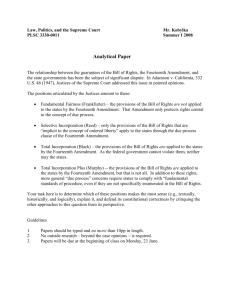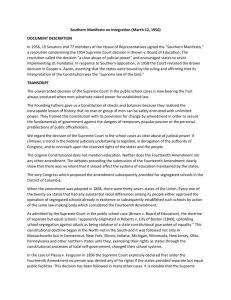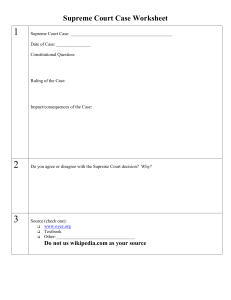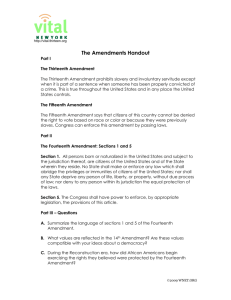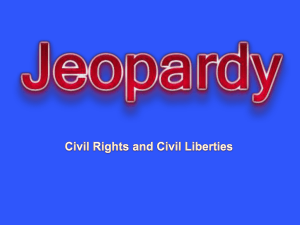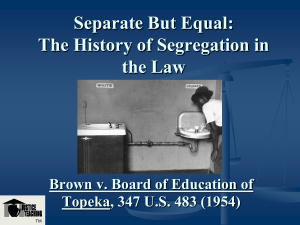Chp 23 Gilded Age politics presentation
advertisement
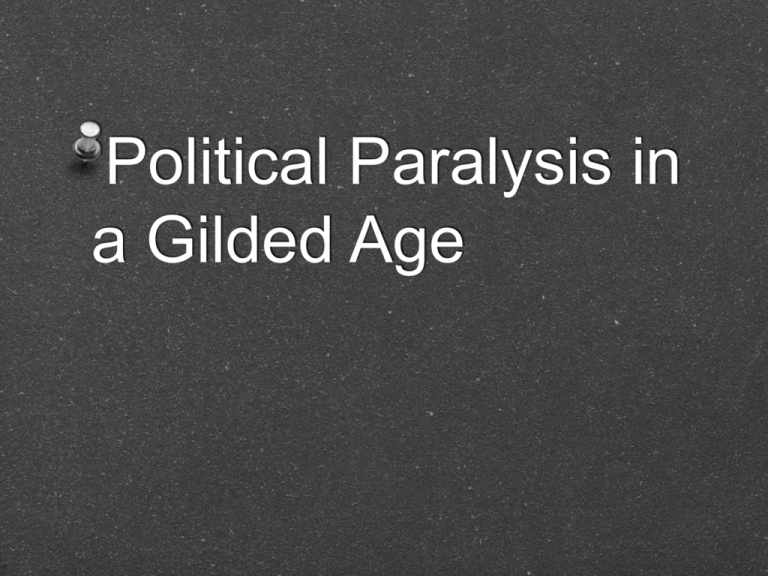
Political Paralysis in a Gilded Age Theme: Even as post-Civil War America expanded and industrialized, political life in the Gilded Age was marked by ineptitude, stalemate, and corruption. Despite their similarity at the national level, the two parties competed fiercely for offices and spoils, while doling our pork-barrel benefits to veterans and other special interest groups. The serious issue of monetary and agrarian reform, labor, race, and economic fairness were largely swept under the rug by the political system, until revolting farmers and a major economic depression beginning in 1893 created a growing sense of crisis and demands for radial change Consider the following: The Grant Administration 1868- 1876 Waving the Bloody Shirt Scandals Grant presided over an era of unprecedented growth and corruption. Credit Mobilier Scandal. Whiskey Ring. The “Indian Ring.” The Tweed Ring William Marcy Tweed (notorious head of Tammany Hall’s political machine) [Thomas Nast crusading cartoonist/reporter] Presidential Election 1872 The Panic of 1873 It raises “the money question.” debtors seek inflationary monetary policy by continuing circulation of greenbacks. creditors, intellectuals support hard money. 1875 Specie Redemption Act. 1876 Greenback Party formed & makes gains in congressional races The “Crime of ’73’! Legal Challenges The Slaughterhouse Cases (1873) - It is viewed as a pivotal case in early civil rights law, as it narrowly read the Fourteenth Amendment to protect only "privileges or immunities" conferred by virtue of the U.S. but not state citizenship, a distinction which persists to this day. The Slaughter-House Cases gave the Supreme Court its first opportunity to rule on the meaning of the post Civil War amendments. In 1869, the Louisiana state legislature restricted livestock slaughtering in New Orleans to one area and one company on health grounds. It argued that butchering along the Mississippi River above the intake for the city’s water supply was a pollution hazard which needed to be controlled. The incentive for such environmental consciousness was the bribery of the legislators by the powerful members of the corporation that was then given a near-monopoly by the legislature. Butchers whose livelihood was threatened by the law challenged it on the grounds that it interfered with the “privileges and immunities” of national citizenship given them under the Thirteenth and Fourteenth Amendments, and the latter’s due process and equal protection clauses. In its 5-4 decision against the butchers, the US Supreme Court sharply narrowed the Fourteenth Amendment, claiming it created no new national rights and that national citizenship was not supreme over state citizenship. Justice Samuel Miller, writing for the majority, denied that the Thirteenth and Fourteenth Amendments had altered federalism. Civil rights, he said, did not lie in the jurisdiction of the federal government, but “must rest for the security and protection where they have heretofore rested” – with the separate states. According to the Supreme Court, the “privileges and immunities” of national citizenship were limited to the right to petition the federal government for the redress of grievance, to travel to the seat of government, and to have protection on the high seas. It was up to the states to protect the civil rights of their citizens – if they choose to do so. Legal Challenges Bradwell v. IL (1873) - case that solidified the narrow reading of the Privileges or Immunities Clause of the Fourteenth Amendment, and determined that the right to practice a profession was not among these privileges. Later in the day, the Supreme Court issued its decision in Bradwell v. State, which was a foregone conclusion after the Slaughter-House judgment. Myra Bradwell, the publisher of a legal newspaper in Chicago , sought admission to the Illinois bar. The Illinois Supreme Court said she could not be admitted, claiming that it was the intent of the state legislature to prevent the entry of women. Ms. Bardwell took her case to the US Supreme Court on the grounds that her pursuit of her calling was a “privilege and immunity” of United States citizenship under the Fourteenth Amendment. She lost, 8-1. The court citied Slaughter-House and stated that “in the nature of this it is not every citizen of every age, sex, and condition that is qualified for every calling and position.” It further argued that the paramount destiny and mission of women was to fulfill the noble and benign offices of wife and mother. Legal Challenges U. S. v. Cruickshank (1876) - April 13, 1873 This is the date of the single bloodiest event of Reconstruction. Freedmen in Grand Parish, Louisiana feared that white Democrats would take over the government after they refused to recognize the judge and sheriff commissioned by Louisiana ’s governor. For three weeks, the sheriff and his Black posse guarded the courthouse in the county seat of Colfax. Then, on Easter Sunday, a group of more than one hundred whites armed with rifles and cannon attacked the courthouse, set it on fire, and killed sixty members of the posse when they emerged from the burning building. Eventually, ninety-six white attackers were identified by the US Department of Justice, and W.J. Cruikshank and eight others were arrested. They could not be charged with murder in the state court because the state government would not act. They could not be charged with murder in the federal courts since murder was not a federal crime. They were therefore charged under the Civil Rights Enforcement Act of 1870 with conspiring to interfere with the murdered African Americans’ rights to assemble, and with depriving them of their right to “equal protection of the laws” with “due process of the law.” They were convicted by the federal court, but appealed their conviction to the Supreme Court. The court ruled unanimously in favor of Cruikshank and his fellow white plaintiffs. It rejected the view that it was the duty of the federal government to protect the rights of the Black posse. The court claimed that there was no proof that the attack was radically motivated, and that it was the sole obligation of the states – not the federal government – to protect rights guaranteed by the Bill of Rights such as the right of assembly. Chief Justice Morrison Waite then nullified the right of Congress to act to protect the rights of citizens if states refused to do so. He argued that the Fourteenth Amendment had nothing to do with private citizens whose rights might have been violated. After this decision, the murderers were freed. A leader of the Louisiana Bar described local white reaction to the Supreme Court opinion in the following terms.: “When the decision was reached and the prisoners released, there was utmost joy in Louisiana , and with a return of confidence which gave best hopes for the future” (quoted in Howard Meyer, The Amendment that Refused to Die, p. 87) For the rest of the nineteenth century and much of the next, federal prosecution of crimes against Black people was virtually impossible. The way had been paved by the courts for the rule of “lynch law.” Legal Challenges U. S. v. Reese (1876) - This was the Supreme Court's first voting rights case under the Fifteenth Amendment and the Enforcement Act of 1870. A Kentucky electoral official had refused to register an African‐American's vote in a municipal election and was indicted under two sections of the 1870 act: section 2 required that administrative preliminaries to elections be conducted without regard to race, color, or previous condition of servitude; section 3 forbade wrongful refusal to register votes where a prerequisite step “required as aforesaid” had been omitted. The Court held that the Fifteenth Amendment did not confer the right of suffrage but prohibited exclusion on racial grounds. The justices invalidated the operative section 3 since it did not repeat the words about race, color, and servitude and thus exceeded the scope of the Fifteenth Amendment. In this case involving local elections the Court, dominated by Lincoln and Grant Republicans, chose not to set an expansive, national stamp on the Constitution. Though the Court was willing to uphold the Enforcement Acts in cases involving federal elections, its cramped, technical treatment of state and local cases crippled the acts for practical purposes. This left southern states free to disfranchise African‐Americans during the 1890s with literacy, character, and other tests that, while not based on race, were disproportionately exclusive of African‐Americans. Northern Support For Reconstruction Lessens “Grantism” & corruption. Panic of 1873 [6-year depression]. Concern over westward expansion and Indian wars. Key monetary issues: should the government retire $432m worth of “greenbacks” issued during the Civil War. should war bonds be paid back in specie or greenbacks. 1876 Presidential Election Consider the following:
